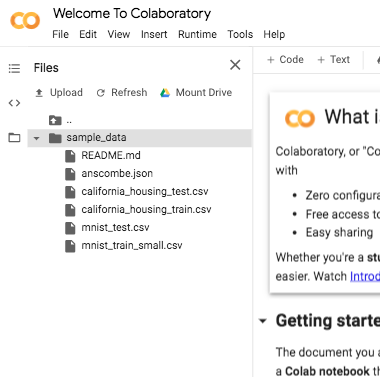

- Colab tools for data analysis. full#
- Colab tools for data analysis. code#
- Colab tools for data analysis. free#
If you are a beginner and trying to learn, we can help you get started on the command line, GitHub, Python or R programming, get an introduction to the wide array of data visualization, GIS, text analysis, and data mining research methods. We offer help to everyone in the CMU and Pittsburgh community at all levels of learning data and programming. Office hours occur every Wednesday at 1-3 PM online, hosted jointly with the CMU Libraries Data Office. The researchers are building this database by using text mining and NLP tools to extract data from journal articles and open source documents accessed through Carnegie Mellon's University Libraries. The project discussed in the video was inspired by a rapidly developing trend of informatics in materials science, and explores the application of Natural Language Processing (NLP) tools to develop a knowledge base for high temperature materials. In Fall 2020, dataCoLAB interviewed Amit Verma and Mike Simko about their experience working with dataCoLAB. Want to learn more or ask questions? Email or join us during Office Hours, held weekly! Spotlight on dataCoLAB Your library support will help you find and use tools for collaborating and documenting your project, and provide guidance on best practices for making your project publically available and citable. Participants get support on research data management, project documentation, and other research methodologies. Information professionals from the CMU University Libraries will help participants connect with collaborators and get started. Learn more about whether dataCoLAB is for you! Or maybe you have data science skills and want to gain experience consulting on interesting real-world data problems. Perhaps you have an existing dataset and want help analyzing, organizing, or visualizing it. The ultimate goal of the dataCoLAB program is to help build a strong community and a healthy data ecosystem.Īnyone from the CMU or Pittsburgh community can participate. The program connects researchers who want more from their datasets with individuals who have data and computer science skills, creating opportunities for people with different technical and disciplinary backgrounds to work together. You might be amazed with how cool this is, wait until you get to try the snippets and all the modules already installed in Colab, by the ways the majority of the most important data science technologies are already installed in it, like Pandas and Numpy.The Data Collaborations Lab (dataCoLAB) at Carnegie Mellon University Libraries connects the research community across disciplinary borders, and facilitates collaborations between data producers and data scientists. You might be thinking: “It sounds cool, however I need to use the terminal” and that’s where it gets even more exciting, by adding an exclamation point (!) you can use it just like you would in Linux or MacOS.
Colab tools for data analysis. code#
It makes life way easier than using and IDE, of course that there are moments in which Colab isn’t appropriate, like when you are Web Scrapping, but for Data Visualization and documenting your code it is the best option.
Colab tools for data analysis. free#
More technically, Colab is a hosted Jupyter notebook service that requires no setup to use, while providing free access to computing resources including GPUs.”Īll you need to have in order to use it is internet and a Gmail account, since codes are saved in Google Drive. “Colab is a product from Google Research, it allows anybody to write and execute arbitrary python code through the browser, and is especially well suited to machine learning, data analysis and education. Okay, but what is Colab? According to Google: Even experienced Data Scientist some times don’t know which tool exactly to use, many of them don’t even know Google Colab, a simple but powerful option for your notebooks.
Colab tools for data analysis. full#
The world of Data Science is full of infinite features and technologies, it is almost impossible to learn every single one of them, many beginners in the world of data science are discouraged by the amount of stacks and tools available in the market. The best option to be used as a data science notebook


 0 kommentar(er)
0 kommentar(er)
